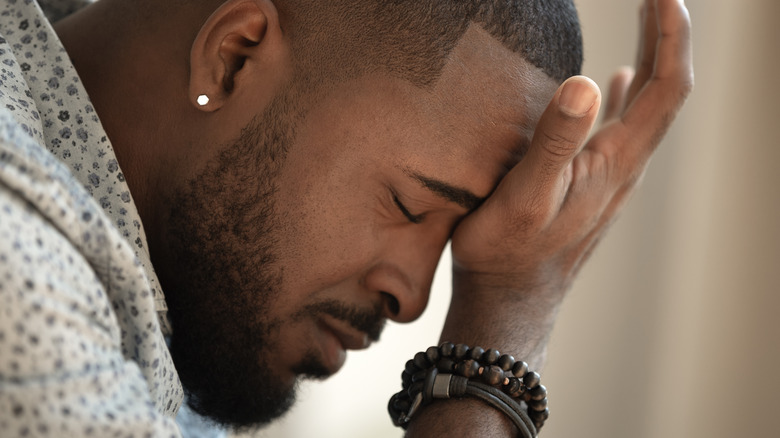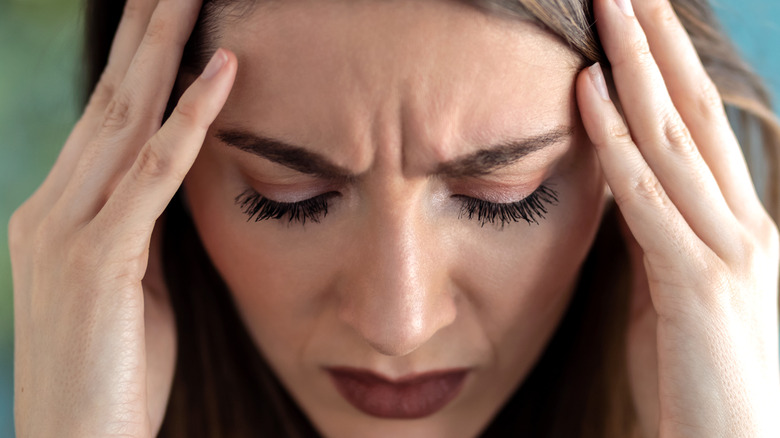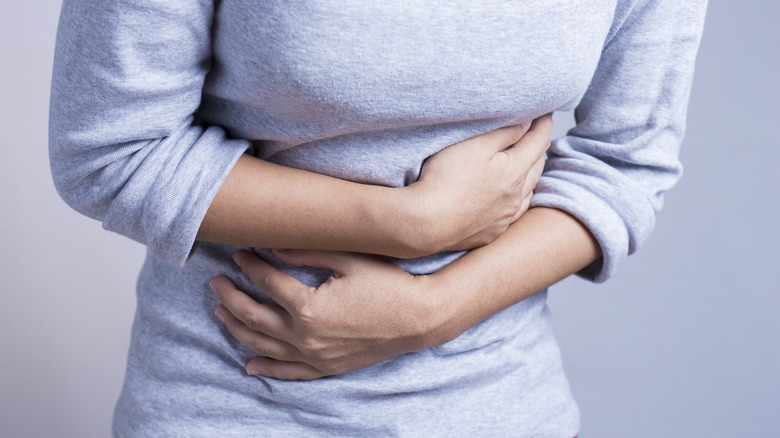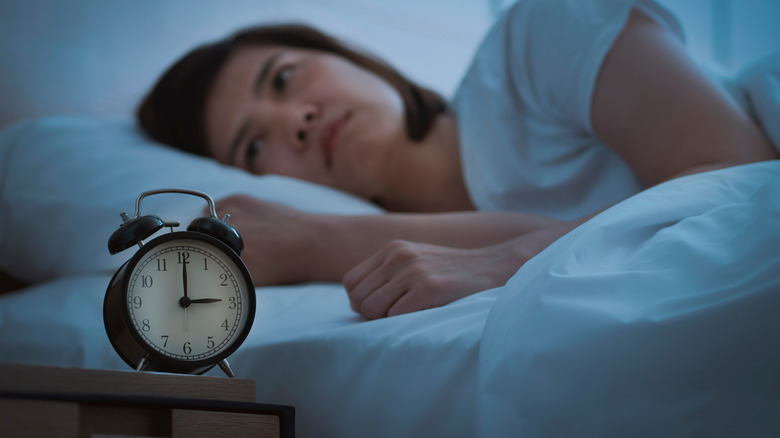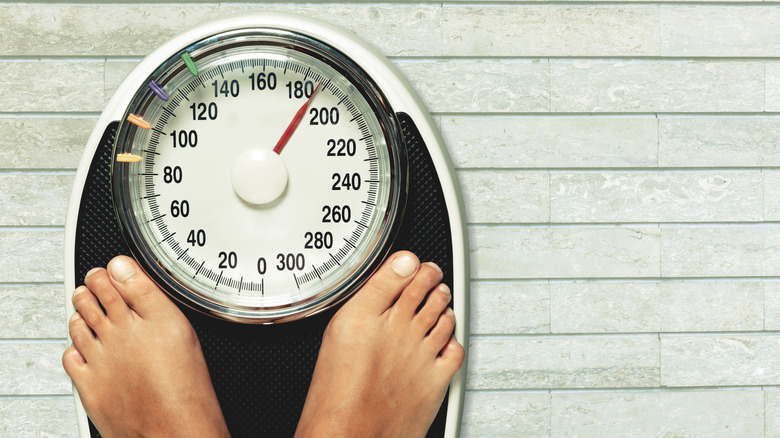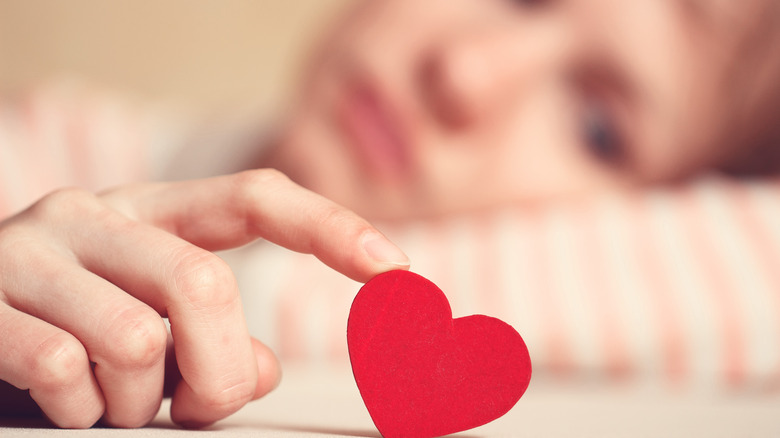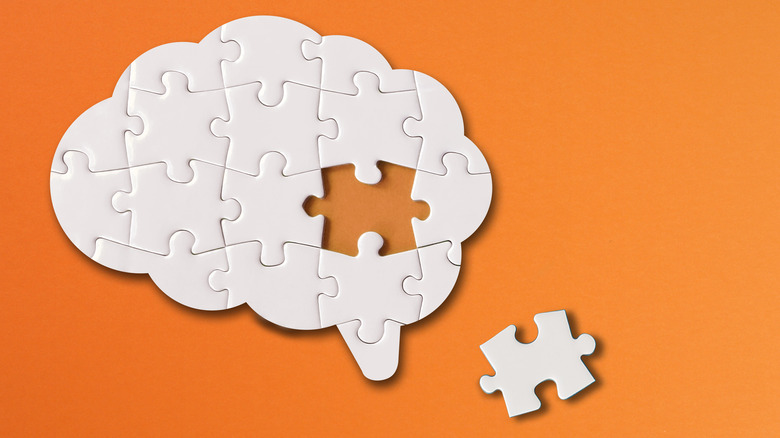When You're Depressed, This Is What Happens To Your Body
Review the common symptoms of depression and you'll find many to be what you'd expect: feeling persistently sad, hopeless, or pessimistic; a lack of interest in hobbies or pleasures; even thoughts of suicide or death. But if you continue deeper into the list, you'll find that even though depression is a mood disorder, its impact goes beyond your frame of mind to disrupt the health of your body. Research continues to discover, and clarify, the ways depression affects your physical health, which in turn grants doctors and other health professionals new tools to understand and treat this disorder — one that will affect one out of every six people at some point in their lifetime.
If you or someone you know is struggling with mental health, please contact the Crisis Text Line by texting HOME to 741741, call the National Alliance on Mental Illness helpline at 1-800-950-NAMI (6264), or visit the National Institute of Mental Health website.
Depression drains your energy
One of the most common symptoms of depression is fatigue. Often this is the kind of all-over tiredness that not only drains the energy from your body and makes you feel weak, but it also makes it hard to think, hard to pay attention to anything, hard to stay interested in anything. Your body may feel heavy, or you may feel sleepy even after you've slept. You may also find that it takes increased effort to do everyday things. One study highlighted in Innovations in Clinical Neuroscience found that 90% of people diagnosed with major depressive disorder had severe fatigue, even though 80% were being treated with antidepressants.
Depression causes fatigue because it affects the neurotransmitters in our brains that relate to alertness, according to HuffPost. It also interferes with our ability to get restorative sleep. The relationship between depression and fatigue can be complicated; sometimes, both have a common underlying trigger. Fatigue can have other causes besides depression, but HuffPost reported that one tell-tale sign that depression is involved is emotional fatigue, feeling disinterested to participate in one's usual activities.
Depression lowers your pain tolerance
Pain isn't just a physical symptom, noted Harvard Health Publishing. It also has an emotional component, affecting our thoughts, mood, and behavior. So it shouldn't be surprising that pain and depression have an intertwined relationship. Depression triples one's risk of developing chronic pain. And people who have chronic pain are three times as likely to develop depression. The connection between pain and depression is so close that almost all drugs used for psychiatric symptoms can also serve as pain medications.
The way our nervous systems operate reflects this connection. The brain circuitry that receives pain signals also reacts to neurotransmitters that regulate mood. The brain has the ability to filter out physical sensations like pain, but when that mechanism is impaired, pain becomes harder to ignore, according to the Harvard publication. Research points to depression altering how people perceive pain, according to an academic review of pain and psychiatric conditions, but the details aren't completely understood.
One study found that volunteers who were put into a sad mood had reduced pain tolerance. MRI scans showed that "their brains processed pain more emotionally, which lead to them finding the pain more unpleasant," study author Dr. Chantal Berna said in a press release. Additionally, a 2015 study found that depression correlated with a lower pain threshold and tolerance. However, a 2016 review of pain and depression research noted that these effects may depend on the type of pain studied, and other unknown factors.
Depression makes your back ache
There may not seem to be an obvious connection between depression and back pain. But as common as low back pain is (worldwide, it causes more disability than any other condition), the causes aren't well understood, according to a study of back pain and depression. As part of that study, researchers examined data from previously published research and determined that showing signs of depression increases one's likelihood of developing back pain by 60%. A similar study found that people with back pain don't recover as well if they also have symptoms of depression.
Depression may lead to back pain because both pain and depression are processed by some of the same neural circuits, and are affected by the same neurotransmitters, researchers noted. It's also possible that depression leads to changes in behavior that make back pain more likely; for example, exercising less, being less active, and not getting enough sleep. Whatever the reason, treating both conditions together could result in better outcomes.
Depression causes headaches
Depression has been linked to both tension headaches and migraines (via Everyday Health). Migraines seem to have the strongest connection; someone who gets migraines is two to three times more likely to have depression as well, compared to someone who's migraine free. And people whose migraines are more frequent are more likely to be depressed than people who experience them less often.
It's not hard to see how someone living with the debilitating pain of migraines might become depressed. But research suggests that the effect works both ways: Having depression seems to increase the odds of developing migraine headaches. "Migraines and depression have common underpinnings in the brain," explained neurologist and professor of epidemiology Richard B. Lipton to Everyday Health. With tension headaches, the type that send you reaching for the acetaminophen, the relationship isn't clear. But studies have found that tension headaches are more common in people who have depression. When you're depressed, stressed, or anxious, muscles in your neck and scalp can tense up, triggering headache pain, according to Prevention.
Depression drains color from your vision
When you're depressed, things look different. This may be true not just metaphorically, but in a literal sense. In a 2021 study, researchers tested the ability of people who'd been diagnosed with depression to perceive a particular optical illusion (via Daily Mail). It turned out that their perception of the illusion was "markedly weaker" compared to people without depression. The illusion, which involves the apparent contrast of gray lines on different backgrounds, is the result of the way that the brain processes vision. So this seems a brain effect rather than something affecting the eyes. With further study, this could lead to a tool to test the effectiveness of treatments for depression.
An older study suggests that depression may have an even more direct impact on the way we see the world. Researchers used a device to measure the electrical activity in the retinas of 80 volunteers, half of whom had been diagnosed with major depression. They found that people with depression had a measurable deficit in their ability to perceive contrast. This "graying" effect might be part of the reason we associate depression with darkness, according to a press release about the study.
Depression affects how your brain talks to your stomach
People diagnosed with depression report more stomach and gastrointestinal problems than people who aren't depressed. One 2020 study found that symptoms like frequent abdominal pain, diarrhea, constipation, dyspepsia, or IBS were almost twice as common in people who had symptoms of depression. Another study found that people with depression were also more likely to have either constipation or diarrhea, compared to non-depressed people.
Some of this may be the effect of living with a chronic illness, which is known to cause emotional distress. But there's also a unique factor at play, what researchers call the "gut-brain axis." Certain neural pathways that are activated when we're stressed can have an effect on the functioning of the upper and lower GI tract. So constant activation of these brain circuits during chronic depression may lead to gastrointestinal problems. In fact, there's a growing medical specialty called "psychogastroenterology" that's focused on the connections between mood, stress, and GI health, a report in Clinical Gastroenterology and Hepatology explained.
Depression makes you vulnerable to chronic illness
It's a grim statistic that people with serious depression die five to 10 years sooner, on average, than people without the disorder, according to a review of research on depression and chronic illness. While they die from the same causes that affect the general population — chronic illnesses like vascular disease, diabetes, and cancer — people who have depression develop these problems earlier in life. Some of this increased risk is related to risky and unhealthy behavior that's a result of psychiatric illness. But depression's physical effects on the body also increase the risk.
This review noted that the relationship between depression and chronic illness is complex, and bidirectional, meaning that each can influence the other. But there are a number of ways that depression might put one's physical health at risk. It raises the levels of the stress hormone cortisol. It's been linked to insulin resistance, a risk factor for diabetes, heart disease, high blood pressure, and an increase in belly fat. It also makes people less likely to engage in healthy habits like exercise. And studies show that in people who have a chronic illness, depression makes it less likely that they'll keep up with the self-care that they need, including taking medication.
Depression can wreck your sleep
Sleep problems are common among people with depression; in fact, 75% of people who are depressed have difficulty falling asleep or staying asleep (via Johns Hopkins Medicine). With depression, sleep is not as restful, and your everyday stresses and concerns are more likely to wake you up at night and keep you awake. And as with other consequences of depression, this cause-and-effect works both ways: Poor sleep that's not addressed can increase your risk of developing depression.
Researchers have found that depression disrupts "sleep architecture," that is, the stages of sleep we go through every night. People who are depressed take longer to fall asleep and wake more often in the night. They don't sleep as deeply and are more likely to wake up early, a 2021 review in the International Journal of Molecular Sciences showed. One study found that people with symptoms of depression were more likely to have nightmares. Sleep and depression are so closely connected that sleep deprivation has been found to ease depression symptoms. Though that's not a practical treatment method, according to the American Sleep Association.
Depression can cause weight gain
Overcoming rising obesity rates among Americans will depend, in part, on addressing depression and other mood disorders that trigger weight gain, according to an academic review of mood and obesity research. Oftentimes people who develop obesity as adults were diagnosed with depression in adolescence or early adulthood. The review noted that one study, which tracked people for 20 years, found that those with symptoms of depression were more likely to increase their body mass index and have bigger waist sizes. An analysis of multiple research studies concluded that depression raised the risk of obesity by 58%.
Part of the issue, the authors of the review stated, is that medications that treat depression can promote weight gain. Some affect appetite, causing people to overeat; others cause fatigue or make people less prone to exercise. But researchers also think that depression leads people to self-medicate by eating to alleviate their mood, especially carbohydrate-rich food. It's the same instinct that has us all reaching for our favorite comfort food at the end of a hard day.
Food rich in carbs triggers the brain to produce serotonin, a mood-boosting neurotransmitter. While it only takes a small number of carbs to produce this effect — 25 to 30 grams — we tend to overshoot when we rip open that bag of chips and start munching. Also, many of the snacks that make us feel better come loaded with dietary fat as well as carbohydrates — looking at you, cookies, donuts, and ice cream.
Depression is a heart disease risk factor, as powerful as smoking
Depression is bad for your heart — maybe as bad as smoking or being overweight, according to one study that examined how anxiety and depression predict major illnesses. That study found that people with high levels of anxiety and depression had a 65% higher risk of heart disease and a 50% higher risk of high blood pressure compared to people without anxiety or depression (via Science Daily). Another study, which examined data from 21 countries, found that the more symptoms of depression people had, the more likely they were to experience cardiovascular disease.
Depression can make us prone to unhealthy behaviors, like smoking and drinking, but it also has physical effects that put us at risk for cardiovascular disease. According to the American Heart Association, depression raises our levels of cortisol and other stress hormones. It also raises our blood glucose levels. People who are depressed are more likely to have high blood pressure, elevated heart rate, and other conditions that threaten heart health.
Depression weakens your bones
You may not realize it, but your skeleton keeps itself pretty busy. Even after you stop growing, your bones are constantly remodeling themselves, with bone tissue being broken down and rebuilt often enough that your entire skeleton replaces itself every 10 years (via Frontiers in Psychology). As we age, the balance between bone loss and bone replacement gets slowly off track and we lose bone mass. If we lose too much, diminished bone density puts us at an increased risk for fractures, a condition called osteoporosis.
Your brain plays a critical role in regulating this bone remodeling process so, naturally, conditions that affect the brain have the potential to influence bone density. This includes depression. One analysis of data relating to nearly 20,000 people found a small to medium difference in bone density between people with and without major depressive disorder; among both men and women, people diagnosed with depression had lower bone density measured at the hip, femur, and spine. Other research has found that people diagnosed with major depression are more likely to have vertebral fractures and low bone density, and are more likely to have osteoporosis. Besides the impact of depression on how the brain regulates bone tissue, some medications used to treat depression may affect bone metabolism, per Frontiers in Psychology.
Depression that worsens over time may increase your risk of dementia
Sometimes depression symptoms occur once and never return. Sometimes depression occurs in discrete intervals that come and go, with symptomless remission in between. In other cases, depression is chronic, worsening over time. According to a study that tracked the mental health of over 3,000 people, the latter course of depression may be an early sign of dementia.
The data comes from a cohort of men and women who were age 55 or older when the study began and had symptoms of depression but no dementia. Over the course of 11 years, 434 people were diagnosed with dementia — Alzheimer's disease in most cases. Only people whose depression symptoms worsened during the course of the study were at increased risk for developing dementia. People whose symptoms came and went, or whose symptoms improved, or even those whose symptoms were high at the beginning and stayed high, weren't at increased risk. This could mean that sometimes, depression and dementia have a common cause. But more research is needed to see if watching for symptoms of depression can help identify people at risk for dementia, and enable preventive therapy, the study authors said.
Depression is a brain-changer
Perhaps the most startling evidence of depression's physical effects is that it can cause parts of your brain to lose tissue, reported WebMD. Which is to say, areas of your brain can shrink. For reasons not completely understood, depression apparently causes the brain to lose what's called gray matter volume (GMV). Gray matter is brain tissue that contains high numbers of nerve cells, enabling it to process and transmit information, a report in StatPearls explained.
Areas of the brain that seem to lose GMV due to depression include the hippocampus, which is involved in learning and memory, and the prefrontal cortex, which is involved in higher-level thinking and planning. Impaired function of the affected areas could lead to memory problems, trouble thinking clearly, feelings of guilt or hopelessness, anxiety, and problems with sleep or appetite. In addition, depression has been linked to inflammation in the brain (though it's not clear which comes first). Inflammation is an immune response that might damage brain cells and prevent new cell growth. The good news, says WebMD, is that there's reason to think that treating depression can help your brain cells form new connections.
Depression raises your risk of autoimmune disease
As the name implies, an autoimmune disease is the case of a malfunctioning immune system attacking one's own body. More than 80 different autoimmune diseases have been identified, including Type 1 diabetes, multiple sclerosis, rheumatoid arthritis, and lupus (via National Institutes of Environmental Health Science).
A number of factors contribute the risk of autoimmune disease, including genetics, nutrition, and exposure to chemicals and toxins in the environment. And it's possible that depression is one of those risk factors. Researchers in Denmark examined the health data of over 1 million people who were free of autoimmune disease at the start of the study. About 145,000 of them had been diagnosed with depression. Over the course of 11 years or more, those with at least one episode of depression had a higher chance of developing an autoimmune disease. According to the researchers, it's possible that depression affects areas of the brain that regulate the immune system, eventually disrupting its normal function.


